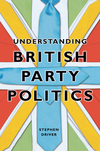Natalie Dzerins reviews Stephen Driver’s clear and concise book on the nature of party politics in the UK, aimed at undergraduate students.
Understanding British Party Politics. Stephen Driver. Polity. April 2011.
Find this book at: ![]() Google Books
Google Books ![]() Amazon
Amazon
 Understanding British Party Politics, by Dr Stephen Driver of Roehampton University, is an entry-level undergraduate textbook which aims to provide the student with a comprehensive overview of the state and nature of party politics in the UK, and to illustrate how we arrived at the current governmental situation.
Understanding British Party Politics, by Dr Stephen Driver of Roehampton University, is an entry-level undergraduate textbook which aims to provide the student with a comprehensive overview of the state and nature of party politics in the UK, and to illustrate how we arrived at the current governmental situation.
Driver offers nine chapters in this book, devoting a chapter each to the British party system, the workings of political parties in general, the Conservative Party, the Labour Party, the Liberal Democrats, the far right, the far left, how devolution has affected the political landscape of the UK, and a discussion of where the party system is likely to go next.
The book is competently, clearly and concisely written, with great and knowledgeable detail given to the historical events and occurrences that created the political parties we have today. However, it strikes me that this book is not wholly fit for purpose as an undergraduate textbook.
From the first chapter, it becomes obvious that Driver’s prosaic style does little to aid the reader. Chapters continue in a narrative style which scans well to the casual reader, but offers little support to the student who might need to revise for an exam. Sometimes Driver’s writing comes across as the stream of consciousness of a man who is clearly passionate about the subject rather than an attempt to educate newcomers to it. For example, in the chapter on far-left parties, Driver reels off lists of factions, splits and ideological differences between parties with barely a pause for breath. Because of this, and other such instances, the book would certainly benefit from more easily revisable tables and visual representations.
A secondary, related, problem with this book is that, unless the reader is interested in the subject and happy to persevere with it, it is very dry and offers little by way of engagement to interest newcomers to the subject. For a book to be successful as a textbook, it needs to offer more to the student than reams of facts and dates. As useful and necessary as these are, it is all too easy for the mind to wander whilst reading. Again, one feels that Driver sometimes forgets the student when he writes.
Finally, I rather fear that Driver expects too much of his readers on occasion. Large and complicated theories and concepts are introduced and discussed with little to no real explanation given for what they mean. In his chapter on the Labour Party, Driver discusses the party’s move away from Keynesian economic theories and the promotion of ‘stable macroeconomic management’, without explaining what either of them mean. It is instances such as this which make me feel that the inclusion of a glossary would make this a better textbook. Perhaps then, the ideal target reader is a student at masters level rather than undergraduate.
However, that is not to say that this is a bad book. Driver presents complicated and detailed information about political parties and systems in a way that is usually accessible to the interested reader, and provides very good analysis of key turning points in party history. For example, his dissection of the Blair/Brown relationship is both easy to follow and highly informative. He also enables students to understand how we have arrived at the current political climate in the UK by offering useful insights into the prevailing ideas of the time, and showing the motivations behind important decision making.
In conclusion, Driver presents us with a good and interesting book about British party politics which, taken on its own, is compelling, insightful and useful. However, for its primary application as a study aid, it falls somewhat short of the mark.
Natalie Dzerins is a law graduate who blogs about feminism and current affairs.
Find this book at: ![]() Google Books
Google Books ![]() Amazon
Amazon








1 Comments